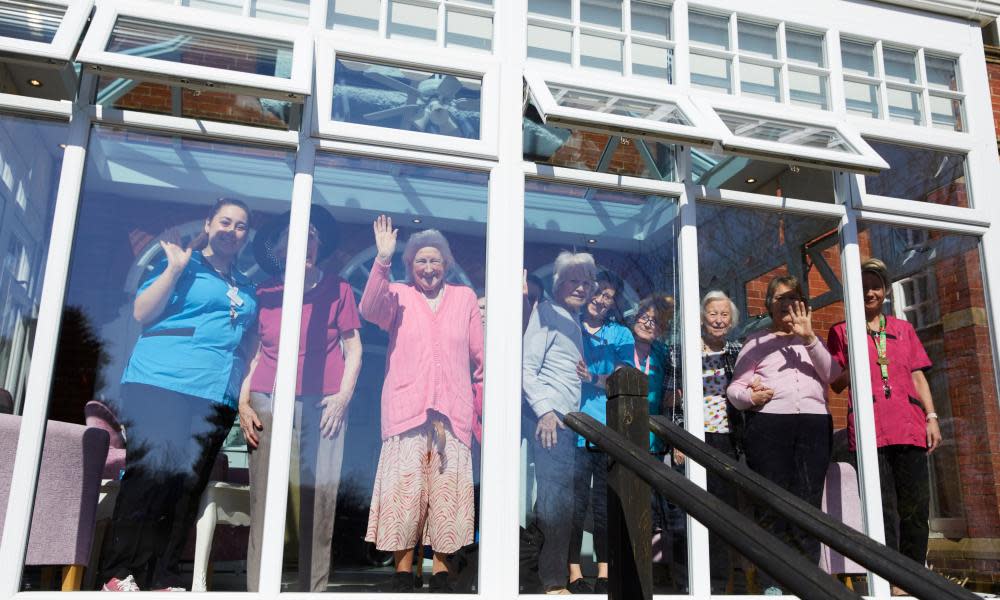Why are we gambling with the lives of elderly people and their carers?

The British are dying in “care” homes across the country without saying goodbye to their families. The government said goodbye to goodbyes on 13 March when it ordered care home providers to “stop all visits to residents from friends and family”.
Helen Wildbore, whose charity, The Relatives & Residents Association, represents the families of elderly people, talks of their acute distress as children and partners disappear from their lives. Some with dementia will only eat and wash when a husband, wife or child is with them. And now they’ve gone.
Few outsiders care about the care services. Residential and nursing homes, and the army of harassed women who go from door to door looking after 350,000 people, are as neglected as the prisons, another Cinderella service that could be ravaged by the virus. Britain is a gambling nation. It gambled that it could neglect social care, just as it gambled that it could manage with fewer doctors and hospital beds than most of the developed world, gambled that it could postpone a lockdown and the mass production of testing kits and protective gear and gambled it could get away with putting an after-dinner funster from the comedy corner of the Telegraph’s comment pages in Downing Street.
Millions gather at their windows to applaud the frontline staff fighting the virus. The organisers say they are clapping “healthcare workers, emergency services, armed services, delivery drivers, shop workers, teachers” and so on, through to vets. Nowhere are home and residential care staff mentioned.
So what, some might say. Banning visits is a necessary measure to contain the danger. It might be if the rest of the care system were not a lethal trap. Stories of the army finding the dead abandoned in their beds that make the hairs on the back of your neck stand on end have come out of Spanish old people’s homes. We’re not there, but no one should be surprised if the system buckled. It could barely cope before.
Compare it with the NHS and you see why social care is an unexploded bomb. We need care workers but we have treated them with contempt. There is no job security for large numbers of workers on zero-hours contracts. Staff turnover is rapid, vacancy rates are high and average hourly pay rates are below those of supermarket workers. We’ve dumped the elderly on a workforce, which has an alarming proportion of staff with no relevant social care qualification. “The point has arguably been reached,” the Centre for Health and the Public Interest thinktank concluded, “where it is no longer a feasible ambition for a care worker to acquire skills and pursue a stable career.” Indeed not. The pay differential between care workers with less than one year’s experience and those with more than 20 is 15p an hour.
When cowed workers meet a global crisis, the result is dire. Care workers are cannon fodder. Despite government promises, they are telling their union, Unison, that they have not received the kit they need to safeguard elderly clients in the highest of high-risk groups, and indeed themselves and their families. Workers on zero-hours contracts who don’t turn up don’t get paid. Unison’s Gavin Edwards tells me that the pressure on staff cannot be imagined by people with secure employment in the NHS and other workplaces governed by proper procedures and union agreements. Union members tell of pushy employers who don’t give a damn about the dangers. Managers were suggesting “we take our children in if we can’t find childcare,” said one.
When cowed workers meet a global crisis, the result is predictably dire. Care workers are cannon fodder
Meanwhile, their employers are demonstrating that we do not have a national care service to match the NHS. They are refusing to take patients who might have the virus. You see their point. It is impossible to maintain social distancing with confused older people. But this refusal illustrates a wider danger. There are 5,500 small companies running homes or providing domestic care workers to councils. Ministers cannot compel them to make best use of their beds or concentrate staff where they are most needed. If Britain had set out to design a care system less able to cope with a national emergency, it couldn’t have done a worse job.
Here we come to the final gamble. The chaotic state of social care for the elderly exists in a Britain dominated by older people. It’s almost a cliche for journalists and academics to say that, as life expectancy has risen, western countries have become gerontocracies. The voting power of the old dominates politics. It delivered Donald Trump, Brexit and Tory governments. When the Conservatives were acting with the utmost cruelty towards benefit claimants of working age, they didn’t dare touch pensioners’ benefits. They increased them, as they knew that age is now a stronger determinant of how voters vote than class. The 2017 general election reminded politicians they could never go against grey power. Theresa May refused to commit to the triple lock on pensions and said that pensioners who could afford it must pay for social care, just as graduates who can afford it must pay for a university education. The uproar forced May into an abject retreat and nearly lost her the election.
The gamble that older voters have taken is that they may not need social care and so shouldn’t be asked to pay extra. Or that if they hold out, Britain will fund it out of general taxation on the young and middle aged, who have already been loaded with vast debts that are growing every day that this crisis continues.
The result is a care “system” that isn’t a system and could be a virus super-spreader. As with so many other gambles Britain has taken, it looks as if the casino is ready to rake in the chips.
• Nick Cohen is an Observer columnist


